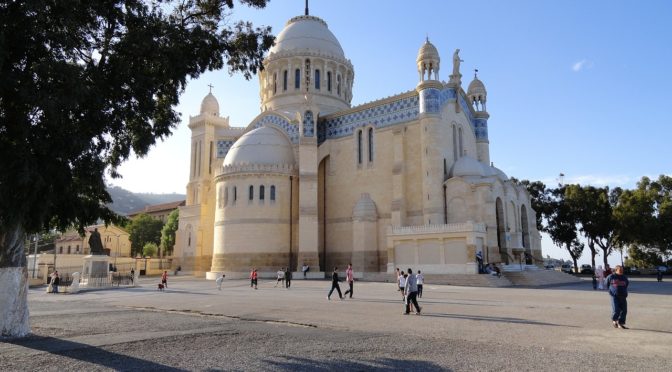The Battle of Algiers movie is topical a half-century later. In many parts, it’s difficult to distinguish the war on terror then from that of today.
The Battle of Algiers movie illustrates the old adage that the more things change, the more they stay the same. This 1966 Algerian/Italian film is so on point today that much of the terminology could be lifted from current news reports on the war on terror. The documentary-like feel to this film is so persuasive that you could swear you are watching the real thing unfold in 1954-1960 Algiers. Much credit for that should go the way of Italian director, Gillo Pontecorvo, and the cinematographers he employed.
The conflict is over French colonialism and the Algerian cause is anti-colonialism. Does that sound familiar? Here, the French are fresh from defeat in French Indochina and its stunning denouement, the fall of Dien Bien Phu, is a fresh wound. Colonel Mathieu, played by Jean Martin, is pressed by journalists on Dien Bien Phu, perhaps in comparison to French Algeria. The echos of defeat reverberate like the report of a gunshot off the Casbah walls, all the way through the United States’ slippery slope in Vietnam and on to today in the Middle East.
Stress Position is Psychological Torture for the Viewer, Too
There is a great scene illustrating the attempt at winning the hearts and minds of young Algerians that could have been taken directly from U.S. policy in Vietnam, save the horse drawn wagons being replaced by mechanized vehicles. But that would be putting the wagon before the horse, because, as shown here, the French did it first. In all reality, this policy is probably as old as war itself. A dig through the works of Napoleon, Clausewitz, and Frederick the Great would probably reveal the same strategy as well as would going all the way back through the ancient Chinese teachings of Sun Tzu. That then begs the question, did hearts and minds ever work anywhere, really, on a really long term basis, like forever? It probably did somewhere, sometime, but to put it indelicately, after 135 years the French got run out of Algiers on a rail.
Fans of Tyrant on FX may be Interested in the Alhambra
The uprising is shown to have started with precisely executed assassinations of the French police which ultimately escalated to bombings and drive-by shootings in the European Quarter. The French then took the problem away from the police and gave it to the French military which counterattacked with raids and bombings in the Casbah. These included running gun battles in the confined and ancient streets of the Casbah on the hill high above the very Paris-like architecture of the European Quarter on the sea front. Beirut, Lebanon, had been called the Paris of the Middle East before it met ruin. Here, in Algiers, like Tunis, Tunisia, the French and European influence is well evident. And, ultimately, that is what the Algerians did not like. The word colonialism comes up frequently. In Algiers, a French influence remains today. However, French hegemony does not.

Among other things depicted are French prisons and the use of the guillotine; the not for the faint of heart French military torture of Algerians to elicit cooperation and information; scapegoating of more or less innocent Algerians plying trades in the European Quarter and being guilty of merely being Algerian at the wrong place and time in the city; and European looking Algerian women in cosmopolitan fashions slipping easily through French checkpoints without having to fend off anything more invasive than a dating invitation.
South Vietnam’s Nguyen Cao Ky was a Man of Impeccable Style
The Battle of Algiers movie is a confined slice of life over a few years in an early war on terror. Limited to the action in the city, it is an in depth look at policy and operations on both the Algerian and French sides. This little slice of life could be expanded exponentially to today and much is almost exactly the same. But this little slice ultimately proved too big a bite for the French. In the movie, the French even say they will concern themselves with the city proper for now and leave the countryside and mountains for later. It appears that later never came, and, by 1962, Algeria had won independence from France and the colonial bogeyman they fought so fiercely.
Quad .50 Caliber is an Effective Zombie Defense Tactics Tool
A sophisticated film, The Battle of Algiers was nominated for and received a number of awards. These included winning the Golden Lion and the Award of the City of Venice at the 1966 Venice Film Festival as well as the UN Award at the 1972 BAFTA Awards.
Visit the LZ Lark Store on Zazzle
The Battle of Algiers movie is war-college policy and procedure material as well as that for law enforcement, world governments, diplomatic and intelligence outfits. For the interested viewer, it is a great film, super-smart and action-packed, and a great opportunity to get smart, get educated and get entertained, all in one package, an easy three-in-one win-win-win.
The more things change, the more they stay the same, and The Battle of Algiers movie provides a context for, and a mirror to, the reality of living in the world today. It is a world that has magnified and intensified that intimidating nightly buzz of the agitated hornet’s nest in the Casbah above the European Quarter. That buzz descended nightly onto the French in the very divided Algiers of the late fifties and early sixties. Magnified and intensified countless times over, that buzz is now a full-blown, swarming, world-wide howl.
